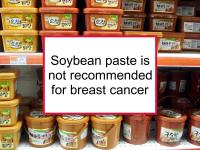Soybean paste is a type of fermented bean paste widely used in Asian cuisine (for example, doenjang in Korea). Soybean paste normally is salty and may also be spicy. The soybeans may be roasted or aged before being ground to make the paste and various other ingredients such as wheat flour, sugar or hot pepper paste may be incorporated.
The conditions of fermentation and microflora used in production also affect the flavor. Soybean paste is used as a condiment to flavor dishes such as stir-fries and soups. Miso is a fermented soybean paste widely used in Japan as a soup base or for seasoning. This webpage focuses on soybean paste — tofu, soybean oil, soy protein isolate and soybeans are covered in separate webpages. We attempt to untangle the conflicting findings regarding breast cancer risk and soybean isoflavones in the genistein and daidzein webpage.
Cancer-related effects of consuming soybean paste
Soybean paste contains higher levels of genistein and daidzein than soybeans and extracts of soybean paste have been shown to have antimutagenic activities. Since soybean paste is a fermented food, it is possible that it might have a beneficial influence on the gut microbiome. However, whereas some Asian population studies have found reductions in breast cancer risk associated with consumption of other soy products such as tofu, such a reduction in risk usually is not found for soybean paste.
On the other hand, Asian studies have consistently found that frequent consumption of soybean paste is associated with higher risk of gastric cancer. Stomach cancer is the most prevalent cancer in Korea and it is also common in other parts of Asia compared to the U.S. Some observers have suggested that the association between soybean paste and gastric cancer is mainly due to its high salt content.
There is some evidence that breast cancer survivors are at increased risk of developing stomach cancer and lobular breast cancer survivors in particular are vulnerable to gastric metastases. However, the effect of consuming soybean paste are likely to be minimal if not part of a high-salt diet; it may be that regularly eating small amounts of soybean paste (including miso) in a diet that contains few other traditional fermented, salted or pickled foods might have little carcinogenic effect compared to eating it as part of a traditional Asian diet.
Soybean paste incorporates some copper (approximately 0.12 mg per ounce, but can be higher), which could contribute to angiogenesis and metastasis of breast cancer, especially in aggressive forms of breast cancer such as inflammatory (IBC), triple negative (ER-/PR-/HER2-), and HER2-positive (HER2+) disease. Although copper is a vital nutrient, women with breast cancer who are not anemic probably should not exceed the RDA (recommended dietary allowance) of approximately 0.9 mg.
Soybean paste should be avoided during treatment with tamoxifen, since soy foods have been shown to weaken the effects of this treatment in premenopausal women with luminal A breast cancer. A 2021 study demonstrated that genistein at a dietary level reduced the treatment effects of cisplatin chemotherapy in an ovariectomized mouse model of breast cancer.
Additional comments
Soybean paste was found to be a meaningful source of aflatoxin B1 in the Korean diet in one study. Aflatoxins, which are mutagenic, carcinogenic and teratogenic and cause immuno-suppression in humans, are produced by molds. Aflatoxin B1 has been shown to cause liver cancer, especially in hepatitis B-positive individuals. Buyers of soybean paste should be aware of its source and assure themselves of its safety and quality.
Miso can have high levels of soy isoflavones whereas soy sauce tends to have low levels.
Sources of information provided in this webpage
The information above, which is updated continually as new research becomes available, has been developed based solely on the results of academic studies. Clicking on any of the underlined terms will take you to its tag or webpage, which contain more extensive information.
Note that while we are continually searching for new evidence concerning soybean paste, there is not much interest in it among cancer researchers so few recent studies that focus on it are available.
